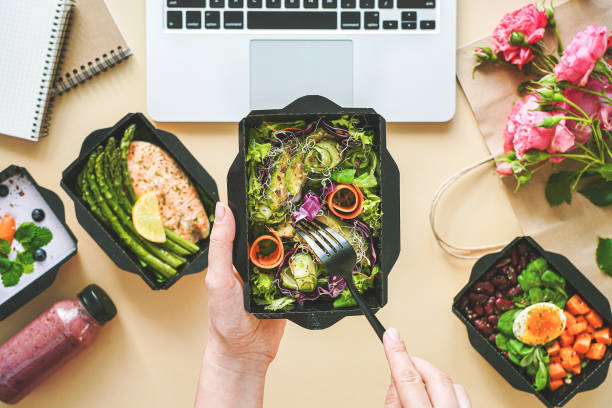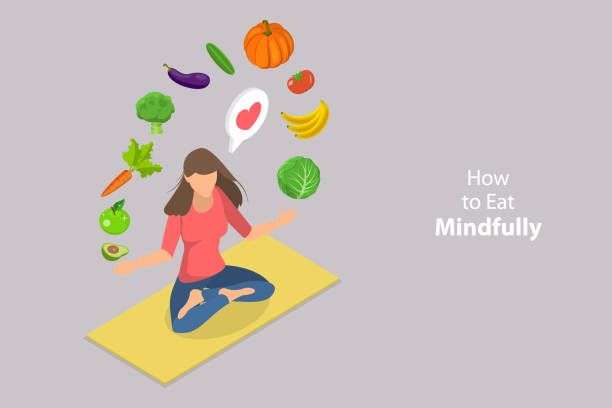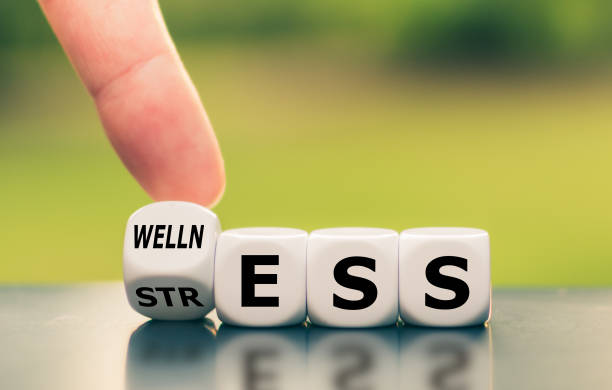- How to Prioritize Meal Planning and Preparation to Save Time and Make Healthier Choices
- How to Incorporate Movement and Exercise Efficiently into Your Daily Activities
- How to Cultivate Mindful Eating Habits to Avoid Overeating and Emotional Eating
- Pay attention to your hunger cues
- How to Prioritize Sleep and Stress Management to Support Your Weight Loss Efforts
- Weight Loss for Busy People: Tips and Tricks
- Conclusion
- Frequently Asked Questions (FAQ) about Weight Loss for Busy People
Losing weight can be a daunting challenge for anyone, but especially for busy people who have to juggle multiple responsibilities and commitments. You may feel like you don’t have enough time or energy to follow a strict diet or exercise regimen, or you may find yourself succumbing to stress eating or convenience foods.
You may wonder if it is even possible to lose weight without giving up your busy lifestyle. The good news is that you can achieve your weight loss goals without sacrificing your lifestyle. You don’t have to starve yourself or spend hours at the gym to see results.
You just have to make some smart and sustainable adjustments to your habits and routines that align with your schedule and preferences. In this article, we will show you how to do that.
We will provide you with comprehensive and actionable advice on weight loss for busy people, covering the following topics:
- How to prioritize meal planning and preparation to save time and make healthier choices
- How to incorporate movement and exercise efficiently into your daily activities
- How to cultivate mindful eating habits to avoid overeating and emotional eating
- How to prioritize sleep and stress management to support your weight loss efforts
- How to use some tips and tricks to boost your weight loss results
By following these strategies, you will be able to lose weight for busy people without feeling overwhelmed or deprived. You will be able to enjoy your food, your work, and your life while achieving your weight loss goals. Let’s get started!
How to Prioritize Meal Planning and Preparation to Save Time and Make Healthier Choices

One of the most important aspects of weight loss for busy people is meal planning and preparation. Meal planning can help you save time and money, avoid food waste, and make healthier choices. Meal preparation can help you streamline the cooking process, portion your meals, and have ready-to-eat food for busy days.
Here are some tips on how to prioritize meal planning and preparation for weight loss:
Plan your meals ahead of time. You can use a weekly or monthly calendar, a meal planner app, or a notebook to plan your meals. Consider your schedule, your budget, your preferences, and your goals when planning your meals.
Try to include a variety of foods from different food groups, such as fruits, vegetables, whole grains, lean protein, and healthy fats. Aim for a balanced and nutritious diet that meets your calorie and macronutrient needs.
Batch cook and meal prep. Batch cooking means cooking large quantities of food at once and storing them for later use. Meal prepping means preparing individual portions of food and storing them in containers for easy access. You can batch cook and meal prep on a weekend or a day off, or whenever you have some free time.
You can use a slow cooker, an instant pot, an oven, or a stovetop to cook your food. You can use glass or plastic containers, ziplock bags, or mason jars to store your food. You can refrigerate or freeze your food depending on how long you plan to keep it. Make sure to label your containers with the date and the contents.
Create healthy, portion-controlled meals. When you batch cook and meal prep, you can create healthy, portion-controlled meals that can help you lose weight. You can use a food scale, measuring cups, or your hand to measure your portions. You can also use the plate method to create balanced meals.
The plate method involves dividing your plate into four sections: one quarter for lean protein, one quarter for whole grains or starchy vegetables, and half for non-starchy vegetables. You can also add a small amount of healthy fat, such as olive oil, nuts, seeds, or avocado. You can also add some low-calorie sauces, dressings, or spices to add flavor and variety to your meals.
Suggest healthy and convenient grab-and-go snacks for busy days. Sometimes, you may not have time to eat a full meal, or you may feel hungry between meals.
In these cases, you can have some healthy and convenient grab-and-go snacks that can keep you satisfied and energized. Some examples of healthy snacks are:
| Snack | Calories | Protein | Carbs | Fat | Fiber |
|---|---|---|---|---|---|
| A medium apple and a tablespoon of peanut butter | 190 | 4 g | 25 g | 8 g | 5 g |
| A cup of low-fat Greek yogurt and a cup of berries | 180 | 18 g | 24 g | 2 g | 4 g |
| A handful of almonds and a small banana | 210 | 6 g | 27 g | 11 g | 5 g |
| A hard-boiled egg and a slice of whole-wheat toast | 170 | 10 g | 15 g | 6 g | 2 g |
| A cup of baby carrots and two tablespoons of hummus | 140 | 4 g | 20 g | 6 g | 6 g |
You can also make your own snack mixes, bars, or muffins using healthy ingredients, such as oats, nuts, seeds, dried fruits, honey, etc. You can store them in airtight containers or bags and take them with you wherever you go.
By prioritizing meal planning and preparation, you can make weight loss for busy people easier and more enjoyable. You can save time and money, avoid food waste, and make healthier choices.
You can also have more control over your portions and calories, and have more variety and flavor in your meals. You can also have some healthy and convenient snacks for busy days.
Meal planning and preparation can help you achieve your weight loss goals without sacrificing your lifestyle.
How to Incorporate Movement and Exercise Efficiently into Your Daily Activities

Another important aspect of weight loss for busy people is movement and exercise. Movement and exercise can help you burn calories, build muscle, improve your metabolism, and enhance your mood.
However, you may feel like you don’t have enough time or motivation to exercise regularly, or you may find it boring or tedious.
The good news is that you can incorporate movement and exercise efficiently into your daily activities. You don’t have to spend hours at the gym or follow a rigid workout routine to see results.
You just have to find small pockets of time throughout the day to engage in movement and choose activities that you enjoy and that suits your fitness level. In this section, we will show you how to do that.
We will provide you with some tips on how to incorporate movement and exercise efficiently into your daily activities, covering the following topics:
- How to find small pockets of time throughout the day to engage in movement
- How to use high-intensity interval training (HIIT) to maximize calorie burn in a short period
- How to incorporate exercise into your daily activities, such as parking farther away or cycling to work
- How to use some visual examples of HIIT workouts and tips for exercising at home
By following these tips, you will be able to incorporate movement and exercise efficiently into your daily activities. You will be able to burn more calories, build more muscle, improve your metabolism, and enhance your mood.
You will also be able to have more fun and variety in your exercise and avoid boredom and monotony. You will be able to achieve your weight loss goals without sacrificing your lifestyle. Let’s get started!
How to Cultivate Mindful Eating Habits to Avoid Overeating and Emotional Eating

Another important aspect of weight loss for busy people is mindful eating. Mindful eating is the practice of paying attention to your hunger cues, your food, and your feelings while eating. Mindful eating can help you avoid overeating and emotional eating, which are common pitfalls for busy people who face stress and time pressures.
Mindful eating can help you eat less, enjoy more, and lose weight. Here are some tips on how to cultivate mindful eating habits for weight loss:
Plan and schedule your meals
One of the benefits of meal planning and preparation is that it can help you plan and schedule your meals. This can help you avoid impulsive decisions driven by hunger or convenience, which can lead to overeating or unhealthy choices.
By planning and scheduling your meals, you can ensure that you eat at regular intervals and that you eat foods that are nutritious and satisfying. You can also avoid skipping meals, which can cause you to binge later.
Pay attention to your hunger cues
Another benefit of mindful eating is that it can help you pay attention to your hunger cues. Hunger cues are signals from your body that tell you when you are hungry and when you are full.
By paying attention to your hunger cues, you can avoid eating when you are not hungry, and stop eating when you are full. You can use a hunger scale to rate your hunger from 1 to 10, where 1 is starving and 10 is stuffed.
You can aim to eat when you are around 3 or 4 and stop when you are around 6 or 7. You can also check in with your hunger cues before, during, and after each meal, and adjust your portions accordingly.
Eat slowly and savor each bite
Another benefit of mindful eating is that it can help you eat slowly and savor each bite. Eating slowly and savoring each bite can help you enjoy your food more, and feel more satisfied with less.
Eating slowly and savoring each bite can also help you digest your food better, and regulate your appetite hormones. You can use some techniques to help you eat slowly and savor each bite, such as:
- Putting down your fork or spoon between bites
- Chewing your food thoroughly and noticing the texture, flavor, and aroma
- Take small bites and swallow before taking another bite
- Drinking water between bites
- Avoiding distractions, such as TV, phone, or computer, while eating
- Engaging in conversation, or listening to soothing music, while eating
Create a healthy eating environment
Another benefit of mindful eating is that it can help you create a healthy eating environment. A healthy eating environment is one that supports your weight loss goals and makes it easier for you to eat mindfully. You can create a healthy eating environment by:
- Using smaller plates and bowls to control your portions
- Serving your food on your plate, rather than eating from the package or the pot
- Keeping healthy foods visible and accessible, and unhealthy foods out of sight and out of reach
- Eating at the table, rather than on the couch or in bed
- Eating with others, rather than alone, and sharing your food experiences
By cultivating mindful eating habits, you can make weight loss for busy people easier and more enjoyable. You can avoid overeating and emotional eating, which can sabotage your weight loss efforts.
You can also eat less, enjoy more, and lose weight. Mindful eating can help you achieve your weight loss goals without sacrificing your lifestyle.
Read Also: Biotox Gold: A Comprehensive Review
How to Prioritize Sleep and Stress Management to Support Your Weight Loss Efforts

Another important aspect of weight loss for busy people is sleep and stress management. Sleep and stress can have a significant impact on your weight loss efforts, affecting your hormones, your appetite, your metabolism, and your mood. Lack of sleep and excess stress can make it harder for you to lose weight, and easier for you to gain weight.
Sleep and stress management can help you support your weight loss efforts, improving your hormones, your appetite, your metabolism, and your mood. Here are some tips on how to prioritize sleep and stress management for weight loss:
Get adequate sleep.
Getting adequate sleep is essential for weight loss, as it can help you regulate your hormones, control your appetite, boost your metabolism, and enhance your mood. Lack of sleep can disrupt your hormones, such as ghrelin and leptin, which control your hunger and satiety signals.
Lack of sleep can also increase your cortisol levels, which can promote fat storage and inflammation. Lack of sleep can also make you crave more sugar and carbs, and make you less likely to exercise. Getting adequate sleep can help you avoid these negative effects, and improve your weight loss results.
You should aim to get at least seven to nine hours of quality sleep every night, depending on your individual needs.
Establish a healthy sleep routine
Establishing a healthy sleep routine can help you get adequate sleep, and improve your sleep quality. A healthy sleep routine involves setting a consistent sleep schedule, creating a relaxing bedtime routine, and avoiding caffeine before bed.
You can use some techniques to help you establish a healthy sleep routine, such as:
- Setting a regular bedtime and wake-up time, and sticking to them as much as possible
- Creating a relaxing bedtime routine, such as reading a book, listening to soothing music, or meditating
- Avoiding caffeine, alcohol, nicotine, and heavy meals before bed, as they can interfere with your sleep quality
- Make your bedroom comfortable, dark, quiet, and cool, and use it only for sleep and intimacy
- Avoiding screens, such as TV, phone, or computer, at least an hour before bed, as they can emit blue light that can disrupt your sleep cycle
- Using a sleep tracker, such as a smartwatch, an app, or a journal, to monitor your sleep patterns and identify areas for improvement
Manage your stress levels
Managing your stress levels is also essential for weight loss, as it can help you improve your hormones, your appetite, your metabolism, and your mood.
Excess stress can disrupt your hormones, such as cortisol and adrenaline, which can promote fat storage and inflammation. Excess stress can also increase your appetite, especially for comfort foods, and make you less likely to exercise.
Managing your stress levels can help you avoid these negative effects, and improve your weight loss results. You can use some techniques to help you manage your stress levels, such as:
- Practicing mindfulness meditation can help you calm your mind, reduce your anxiety, and increase your awareness
- Doing yoga can help you relax your body, improve your breathing, and enhance your flexibility
- Spending time in nature, can help you lower your blood pressure, boost your immune system, and improve your mood
- Engaging in hobbies, such as gardening, painting, or knitting, which can help you express your creativity, distract your mind, and increase your happiness
- Seeking social support, such as talking to a friend, a family member, or a therapist, which can help you vent your emotions, share your problems, and receive advice
By prioritizing sleep and stress management, you can make weight loss for busy people easier and more enjoyable. You can improve your hormones, your appetite, your metabolism, and your mood.
You can also avoid the negative effects of sleep deprivation and stress, which can sabotage your weight loss efforts. Sleep and stress management can help you achieve your weight loss goals without sacrificing your lifestyle.
Read Also:
>> Diet Plan For Weight Loss At Home: How To Eat Healthy And Stay Fit
>> How To Lose Weight Without Counting Calories: The Secrets Of Eating Quality Foods
>>How To Biohack Your Sleep: 10 Tips To Sleep Better And Feel Amazing
Weight Loss for Busy People: Tips and Tricks

In this section, we will share some weight loss tips and tricks for busy people that can help you boost your weight loss results. These tips and tricks are based on scientific research and proven methods and can help you lose weight faster and easier.
Here are some tips and tricks for weight loss for busy people:
Drink more water
Drinking more water can help you lose weight, as it can help you stay hydrated, flush out toxins, and suppress your appetite.
Water can also help you burn more calories, as it can increase your metabolic rate and thermogenesis. You should aim to drink at least eight glasses of water a day, or more if you are active or live in a hot climate. You can also drink other fluids, such as green tea, black coffee, or lemon water, as long as they are sugar-free and calorie-free.
You can also add some fruits, herbs, or cucumber to your water to make it more flavorful and refreshing.
Eat more protein
Eating more protein can help you lose weight, as it can help you build muscle, improve your metabolism, and reduce your hunger. Protein can also help you preserve your muscle mass, which can prevent your metabolic rate from slowing down as you lose weight.
You should aim to eat at least 0.8 grams of protein per kilogram of body weight, or more if you are active or want to build muscle. You can get protein from animal sources, such as lean meat, poultry, fish, eggs, and dairy, or plant sources, such as beans, lentils, tofu, nuts, and seeds.
You can also use protein supplements, such as whey, casein, or soy, to boost your protein intake.
Eat more fiber
Eating more fiber can help you lose weight, as it can help you feel fuller, lower your blood sugar, and improve your digestion. Fiber can also help you prevent constipation, which can cause bloating and weight gain.
You should aim to eat at least 25 grams of fiber a day, or more if you have digestive issues. You can get fiber from fruits, vegetables, whole grains, legumes, nuts, and seeds. You can also use fiber supplements, such as psyllium, oat bran, or glucomannan, to increase your fiber intake.
Use smaller plates and bowls
Using smaller plates and bowls can help you lose weight, as it can help you control your portions and reduce your calorie intake. Smaller plates and bowls can create an optical illusion, making you think that you are eating more than you actually are.
This can trick your brain into feeling more satisfied and less hungry. You can also use the same technique with your utensils, such as using smaller spoons and forks, or chopsticks, to slow down your eating and savor each bite.
Track your progress
Tracking your progress can help you lose weight, as it can help you monitor your results, motivate you, and keep you accountable. You can track your progress by using a scale, a tape measure, a body fat analyzer, or a fitness tracker.
You can also use a journal, an app, or a website to record your weight, measurements, calories, macros, exercise, and mood. You can also take photos of yourself, or use a mirror, to see how your body changes over time.
You can track your progress daily, weekly, or monthly, depending on your preference and goals. You can also reward yourself for reaching your milestones, such as buying new clothes, getting a massage, or taking a trip.
Conclusion
In this article, we have shown you how to lose weight for busy people without sacrificing your lifestyle. We have provided you with comprehensive and actionable advice on how to:
- Prioritize meal planning and preparation to save time and make healthier choices
- Incorporate movement and exercise efficiently into your daily activities
- Cultivate mindful eating habits to avoid overeating and emotional eating
- Prioritize sleep and stress management to support your weight loss efforts
- Use some tips and tricks to boost your weight loss results
By following these strategies, you will be able to lose weight for busy people without feeling overwhelmed or deprived. You will be able to enjoy your food, your work, and your life while achieving your weight loss goals.
We hope you found this article helpful and informative. If you did, please share it with your friends, family, or colleagues who may also benefit from it. You can also leave us a comment below and let us know what you think. We would love to hear from you!
Thank you for reading, and good luck with your weight loss journey! 😊
Frequently Asked Questions (FAQ) about Weight Loss for Busy People
In this section, we will answer some of the most frequently asked questions (FAQ) about weight loss for busy people. These questions are based on common concerns and challenges that busy people face when trying to lose weight. We hope that these answers will help you understand and overcome these issues, and achieve your weight loss goals.
Q: How much weight can I lose as a busy person?
A: The amount of weight that you can lose as a busy person depends on several factors, such as your current weight, your calorie intake, your activity level, your metabolism, your age, your gender, and your health conditions. However, a general rule of thumb is that you can lose about one to two pounds per week by creating a calorie deficit of 500 to 1000 calories per day.
This means that you have to burn more calories than you consume, either by eating less, moving more, or both. You can use a calorie calculator, such as [this one], to estimate your calorie needs and your calorie deficit.
Q: How can I find time to exercise as a busy person?
A: Finding time to exercise as a busy person can be challenging, but not impossible. You don’t have to spend hours at the gym or follow a rigid workout routine to see results.
You just have to find small pockets of time throughout the day to engage in movement and choose activities that you enjoy and that suits your fitness level. Some examples of how to find time to exercise as a busy person are:
- Taking the stairs instead of the elevator
- Walking or cycling to work or the store
- Doing short workouts at home, such as HIIT, yoga, or resistance training
- Taking advantage of your breaks, such as lunch breaks, coffee breaks, or meetings, to do some stretches, squats, or push-ups
- Joining a fitness class, a sports team, or a walking group that fits your schedule and interests
- Setting a reminder or an alarm on your phone or computer to get up and move every hour
Q: How can I avoid stress eating and emotional eating as a busy person?
A: Stress eating and emotional eating are common pitfalls for busy people who face stress and time pressures. Stress eating and emotional eating are the tendencies to eat more or make unhealthy food choices due to stress, anxiety, boredom, sadness, anger, or other emotions.
Stress eating and emotional eating can sabotage your weight loss efforts, and affect your health and well-being. To avoid stress eating and emotional eating as a busy person, you can:
Identify your triggers and patterns. Try to notice what causes you to stress eat or emotional eat, such as certain situations, people, or feelings. Also, try to notice what foods you tend to crave or reach for, such as sweets, carbs, or junk food. By identifying your triggers and patterns, you can be more aware and prepared to deal with them.
Find healthy alternatives. Instead of using food as a coping mechanism, try to find healthy alternatives that can help you manage your stress and emotions, such as:
- Practicing mindfulness meditation can help you calm your mind, reduce your anxiety, and increase your awareness
- Doing yoga can help you relax your body, improve your breathing, and enhance your flexibility
- Spending time in nature, can help you lower your blood pressure, boost your immune system, and improve your mood
- Engaging in hobbies, such as gardening, painting, or knitting, which can help you express your creativity, distract your mind, and increase your happiness
- Seeking social support, such as talking to a friend, a family member, or a therapist, which can help you vent your emotions, share your problems, and receive advice
Plan and schedule your meals. One of the benefits of meal planning and preparation is that it can help you plan and schedule your meals.
This can help you avoid impulsive decisions driven by hunger or convenience, which can lead to stress eating or emotional eating. By planning and scheduling your meals, you can ensure that you eat at regular intervals and that you eat foods that are nutritious and satisfying.
You can also avoid skipping meals, which can cause you to binge later.




